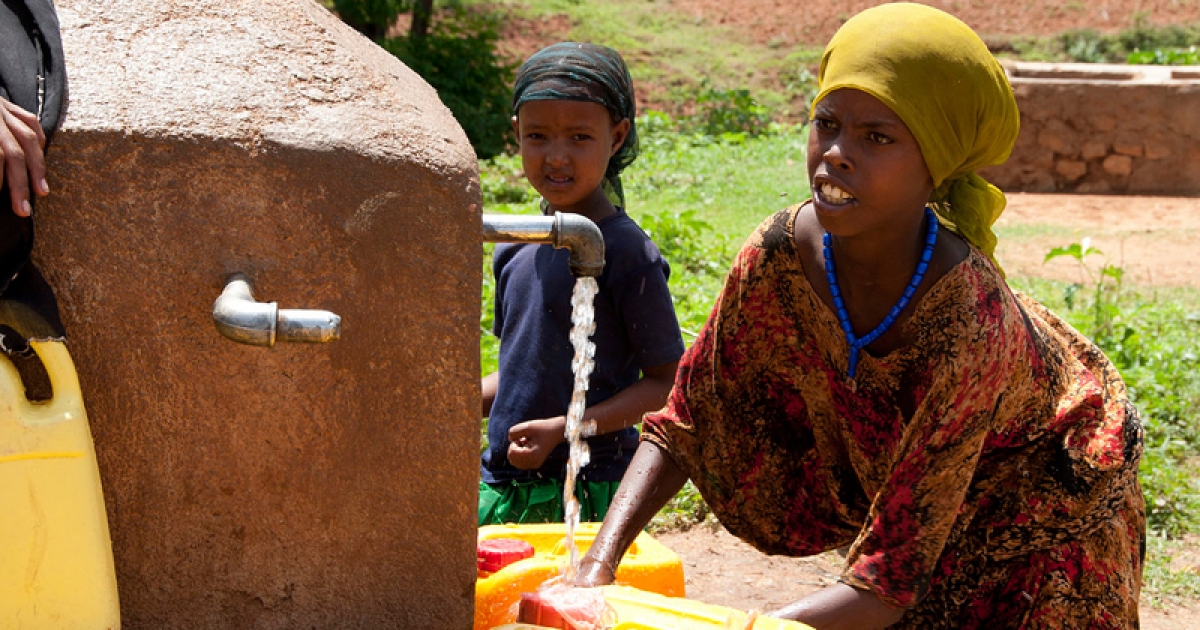“Water Scarcity Threatens our Quality of Life”
There is good news and bad news. The good news is that 1.4 billion people have gained access to basic drinking water services since 2000, including piped water into homes or a protected dug well, UNICEF estimates. The bad news is that there is still a long – long – way to go. An unfortunate collision of natural pressures and human factors – climate change and over-consumption – are creating a perfect storm. The power of this storm will only intensify as the global population soars by nearly a third to 9.7 billion by 2050. Do not make the mistake of believing water scarcity is a problem for our children and grandchildren. It is our problem, right now.
The World Economic Forum (WEF) cites water scarcity as one of the greatest risks facing the world, while the World Bank estimates that 4.5 billion people lack safely managed sanitation services and 2.1 billion people lack access to safely managed drinking water services. By 2030, the world will face a 40% shortfall between forecast demand and an available supply of water.
Cape in crisis
The statistics have a very real face. Water scarcity threatens to bring one of Africa’s most vibrant cities to a standstill: Cape Town is nearly on its knees. “No-one should be showering more than twice a week. You need to save water as if your life depends on it – because it does,” stressed Helen Zille, Head of the provincial government earlier this year as the city braced to turn off its supply of running water. The dire situation has been pushed back to 2019 – for now. In an urgent bid to preserve their daily routine, residents have been collecting dirty water that is typically used for cleaning and cooking to reuse in their toilets and gardening. The Cape’s strife has dominated newspaper headlines, but it marks just another step in a global narrative that is fast gaining pace.
"Water management will shape our quality of life - Placing accountability on consumers, together, will trigger much-needed change"
The World Resources Institute (WRI) found in 2015 that Chile, Estonia, Namibia and Botswana could face an especially significant increase in water stress by 2040. The Institute added that global superpowers, such as China, India and the US – cited by PwC as the world’s three biggest economies by 2050, respectively – face water risks of their own. History books contain alarming clues as to what may lie ahead. For example, drought conditions in China in 2006 threatened 95 million people; nearly 20 million more people than the UK’s entire population. The dire impact of an 18-month drought in East Africa is also highly visible. “In previous droughts, we used to lose some animals, but we would always have food and water. But this is different. It is ‘sweeping away’ animals and people,” 70-year old Abdilal Yassen reported to Oxfam.
The Middle East could suffer the most. Fourteen of the 33 most likely water-stressed countries in 2040 are in the region. Nine are considered extremely stressed: Bahrain, Kuwait, Palestine, Qatar, the UAE, Israel, Saudi Arabia, Oman and Lebanon. The World Bank’s research adds to the uneasy outlook. The total water productivity in the Middle East and North Africa (MENA) is half the world’s average and the region could have the greatest economic losses from climate-related water scarcity by 2050, at up to 14% of GDP. Realising such figures would symbolise a major economic and civil blow.
Step-by-step
A silver bullet eludes us, but responsible and proactive governments can play a major role in carving out a new status quo. The negative impacts of climate change on water could be neutralised with better policy decisions and some regions could improve their growth rates by up to 6% with better water resource management, suggests the World Bank. Allocating even 25% of water to more highly-valued uses, such as more efficient agricultural practices, can help dramatically reduce economic losses.
Solutions to countering water scarcity need not reinvent the wheel; leveraging nature-based tools can be highly effective and cost-efficient. Audrey Azoulay, UNESCO’s Director General, advocates small-scale water harvesting structures in Rajasthan, India, which brought water back to 1,000 drought-stricken villages, for example. And in Jordan’s Zarqa River basin, the revival of traditional ‘hima’ land management practices yield higher quality spring water by not over-exploiting the soil.
Evolving policy must run parallel to public education. The message must hit home: water management will shape our quality of life. Can you imagine driving your car to the next city without putting on your seatbelt, or not using your recycle bin? Of course not. But you would have happily done so before road safety and environmental campaigns reshaped your habits. The way we consume water is no different. Putting water labels on food packaging and consumer products – i.e. ten litres of water were used in the farming, packaging and transportation of this salad – will give us an educated filter to monitor our consumption. Placing accountability on consumers, together, will trigger much-needed change. We cannot afford for this proverb to ring true in the 21st century:“We never know the worth of water until the well is dry.” World Water Week is scheduled for August. How can you make the next three months, and beyond, count?
Published: 02/05/2018



